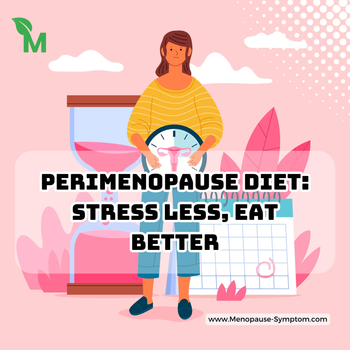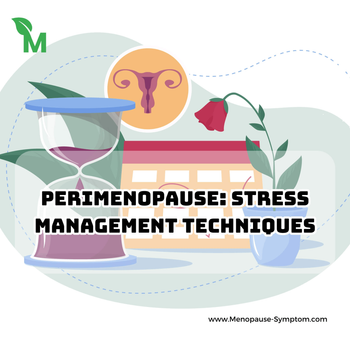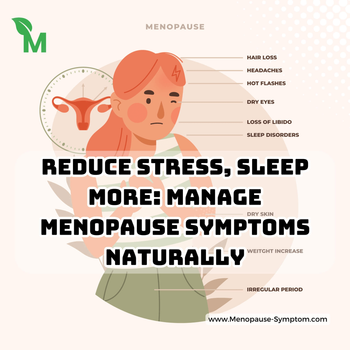This stage can cause stress, anxiety, and emotional instability. However, applying relaxation techniques can help effectively manage perimenopause stress, creating conditions for a peaceful and happy life.
Perimenopause usually occurs between the ages of 40 and 50, and lasts for several years before menopause officially occurs. Hormonal changes, specifically a decrease in estrogen levels, can lead to symptoms such as hot flashes, night sweats, insomnia, and mood swings. These symptoms can create high levels of stress, reducing a woman's quality of life. Therefore, finding relaxation techniques is necessary to improve mental and physical health during this period.
Recognize some common symptoms:
Irregular menstrual cycle or amenorrhea: This is the first symptom of perimenopause, the menstrual cycle becomes irregular, more unpredictable than before. The amount of menstrual blood is similar, it can suddenly be less or more (hypermenorrhea or oligomenorrhea), or there may be amenorrhea in some cycles.
Hot flashes are one of the common signs of perimenopause, women will start to have sudden hot flashes starting in the face, neck and then spreading to other parts. In addition, women also sweat, rapid heartbeat makes the body tired.
Insomnia: Women may experience sleep problems such as insomnia, poor sleep. Some people may wake up frequently in the middle of the night and have difficulty falling back asleep. Symptoms such as hot flashes or irregular periods also affect sleep and thus lead to poor health in women during perimenopause.
Relaxation and stress reduction methods
One of the most effective relaxation techniques is meditation. Meditation helps calm the mind and has a positive effect on the body. When practicing meditation, the brain will rest, helping to reduce stress and anxiety. Research shows that women going through perimenopause can benefit from daily meditation, which not only improves mood but also reduces some physical symptoms such as headaches or muscle pain.
In addition to meditation, yoga is also a very popular relaxation method. Gentle yoga exercises not only help the body become more flexible but also support in regulating breathing, helping women in perimenopause feel more relaxed and peaceful. Yoga can also contribute to reducing menopausal symptoms, thanks to improving blood circulation and relieving hot flashes. Regular yoga practice during this time can bring positive benefits to both the mind and body.
Physical activity is another important factor in managing stress during perimenopause. Walking, cycling or swimming not only improves physical and cardiovascular health, helps you have a toned body but also reduces feelings of stress. Regular physical activity can stimulate the production of endorphins, a positive hormone that the body produces to fight stress and bring about a feeling of happiness.
In addition, self-care is also very important during perimenopause. This means spending time on personal hobbies, reading, listening to music, or trying out new skills. When women spend time taking care of themselves, they will feel more confident and can manage stress more easily. The satisfaction from personal hobbies will help balance emotions, while also limiting the negative effects of stress on the mind.
Exploring natural therapies such as aromatherapy is also an ideal option. The scent of essential oils such as lavender, lemon or peppermint is not only relaxing but can also improve the mood of women going through perimenopause. Soaking in a warm bath with your favorite essential oil can also be a great way to take a break from everyday worries and find peace of mind.
In addition, food also plays an important role in managing stress and protecting health during perimenopause. A balanced diet rich in vitamins and minerals will support the immune system and provide energy. Foods such as salmon, nuts, green vegetables and fresh fruits are good for women during this period. Avoiding foods containing caffeine and sugar is also essential to protect mental stability.
Sleep quality is also a factor that cannot be ignored. Adequate sleep helps restore energy and effectively reduce stress. Relaxing exercises before going to bed such as reading, listening to soft music or taking a warm bath will help you sleep deeper and better. Lack of sleep can make perimenopause symptoms worse, so maintaining a reasonable sleep routine is essential.
In addition, socialization is also an important factor in reducing stress. Communicating with friends and family will create a feeling of love and support. Participating in community activities or women's groups are also good ways to connect and ease the complicated emotions of perimenopause.
Finally, don't forget the importance of seeking information and support from a professional. Talking to your doctor or mental health professional can help you understand the changes your body is going through. They will provide more comprehensive solutions to the problems you are facing during perimenopause.
If you take the time to practice these relaxation techniques, your home will become more peaceful. Perimenopause and menopause are not a battle but a journey of self-discovery. With effective relaxation techniques, you can better manage stress so you can enjoy life to the fullest. Self-care is an act of love and respect for yourself. Remember, everyone has the right to live a happy and healthy life, especially during this perimenopause period.
Source: Team MPS compiled, analyzed and wrote. Please dont reup without source. Many thanks.

Perimenopause Diet: Stress Less, Eat Better
10.08.2024
Perimenopause is a stage that many women face before officially entering menopause. This is a time that marks major changes in the body, including hormonal imbalances and uncomfortable symptoms.

Perimenopause: Stress Management Techniques
10.07.2024
In every woman's life journey, perimenopause is a special period, marking a major physical and psychological transformation. Perimenopause is not simply a change in hormones, but also a time when imbalance can lead to negative emotions.

Reduce Stress, Sleep More: Manage Menopause Symptoms Naturally
10.08.2024
Menopause is a natural phase in every woman's life, usually occurring between the ages of 45 and 55.
